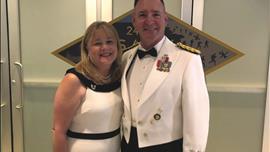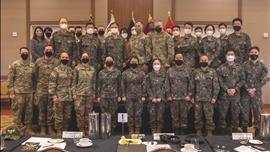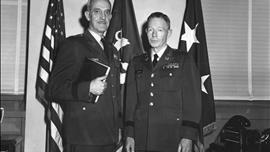
And so it would begin. It may be true that some trial attorneys can remember every closing argument. I cannot. But I do remember many—and I remember my hours of preparation, the tortured phrasings, and the rehearsals. I remember the recognition that I had little time to adjust my planned argument after the facts that actually came out at trial didn’t quite match the eloquent argument I had prepared.

On 24 July 2021, as the Honorary Regimental Colonel of the Judge Advocate General’s (JAG) Corps, I will proudly drink a toast to the 40th anniversary of the men and women of the 96th Basic Course of the JAG School where I started my career as an Army lawyer. Over the years, and even now as a retired judge advocate (JA), I am constantly amazed at how service in the JAG Corps produces so many lifelong friendships that endure the test of time, professional association, and geography.

News & Notes 2021 Issue 3

While every member of the Corps knows that the Deputy Judge Advocate General is the No. 2 lawyer in the organization, few know the history of this important position, much less that it did not exist in its present form until after World War II.

As a lifelong Raiders fan, I am intimately familiar with the potential hazards of excessive loyalty to a team. I grew up in northern California when the Oakland Raiders were one of the most dominant teams in the National Football League. I remained loyal to them when they moved to Los Angeles and won their third Super Bowl in eight years.

It beats the hell out of me . . . why everyone tries so hard to show that the prosecution were [sic] insidious, underhanded, unethical, immoral and God knows what monsters, that unfairly convicted a group of whiskerless Sunday school boys. What motivates you authors? I think that my staff did a hell of a great job.

The implementation of the Military Justice Act of 2016 (MJA 2016) brought with it the first completely new court-martial forum in over fifty years: the judge-alone special court-martial (JA-SPCM).

A Texas civilian plaintiff’s attorney glares at the witness and questions, “If you had done your job as a commander, Mrs. Giffa would be alive today, wouldn’t she, Major Miller?” In federal civil court in Austin, Texas, a former company commander sits on the stand for hours, defending her response to a domestic violence (DV) incident years earlier between a Soldier and his spouse.

Just as you start to get comfortable as a newly-minted judge advocate (JA) practicing administrative law, your deputy staff judge advocate calls you into their office.

You have less than forty-eight hours in theater when you receive your first request for a Foreign Excess Personal Property (FEPP) legal opine. Barely knowing how to spell FEPP, you crack open the excel spreadsheet and see dollar signs with lots of commas.